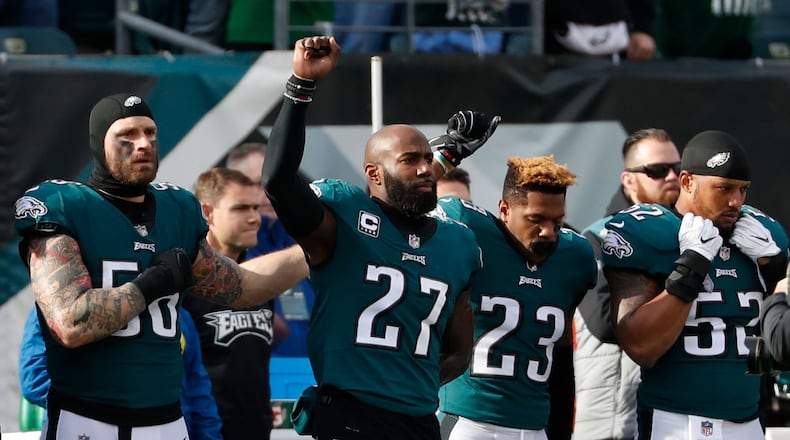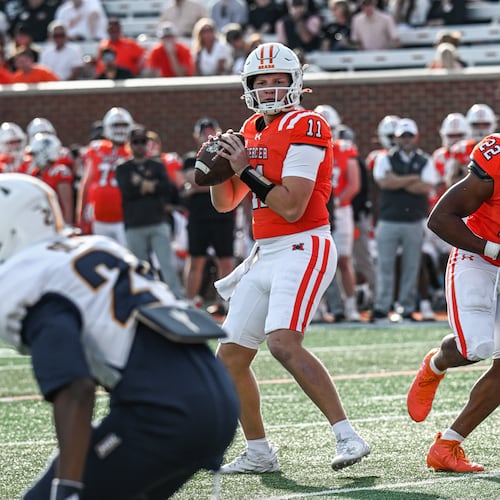In a New York Times opinion piece released Thursday morning, several NFL players in the NFL Players’ Coalition asked President Donald Trump to work toward criminal justice and sentencing reform in the United States.
NFL players Doug Baldwin, Anquan Boldin, Malcolm Jenkins and Benjamin Watson wrote an opinion piece for the New York Times that echoed the president's recent suggestion that if they stopped protesting during the playing of the national anthem, Trump would receive names of prisoners who have been treated unfairly in the criminal justice system.
While the op-ed said the president should be commended of his pardon of Alice Johnson earlier this month for her nonviolent drug offense over two decades ago, the players wrote pardons will not address the problems within the criminal justice system.
“These are problems that our government has created, many of which occur at the local level,” the op-ed said. “If President Trump thinks he can end these injustices if we deliver him a few names, he hasn’t been listening to us. As Americans, it is our constitutional right to question injustices when they occur, and we see them daily: police brutality, unnecessary incarceration, excessive criminal sentencing, residential segregation and educational inequality.
“The United States effectively uses prison to treat addiction, and you could argue it is also our largest mental-health provider... We must challenge these norms, investigate the reasons for their pervasiveness and fight with all we have to change them. That is what we, as football players, are trying to do with our activism.”
The op-ed comes after frequent criticism by Trump regarding NFL players protesting social injustice and police brutality by peacefully kneeling, sitting or raising a fist during the playing of the national anthem over the past two seasons.
In response to criticism by Trump and NFL fans, owners and commissioner Roger Goodell agreed in May to implement a policy for the 2018 season that requires players to stand during the playing of the national anthem or remain in the team's locker rooms.
Many of the players involved in Thursday’s campaign to transform the criminal justice system are members of the reigning Super Bowl champion Philadelphia Eagles team whose invitation to the White House was rescinded by the President on June 5.
Thursday’s New York Times op-ed, which contained several ideas to improve the criminal justice system, ended with players asking Trump and elected officials to use their power to create positive change.
"President Trump, please note: Our being professional athletes has nothing to do with our commitment to fighting injustice," the letter read. "We are citizens who embrace the values of empathy, integrity and justice, and we will fight for what we believe is right. We weren't elected to do this. We do it because we love this country, our communities and the people in them. This is our America, our right."
Jenkins, along with two co-authors of the op-ed, further contributed to the conversation of criminal justice reform with a video on Twitter Thursday that called for Trump to pardon inmates who have been sentenced to life without parole for nonviolent offenses.
“Our system is not rehabilitated,” Jenkins said. “There needs to be a focus on helping people become better contributing citizens when they do return to society as well as the opportunity to re-enter in a reasonable time for nonviolent offenses.”
Jenkins’ teammates Eagles wide receiver Torrey Smith and Chris Long also addressed Trump in videos posted on their personal Twitter accounts. Smith advocated for resources to hold police accountable and for Americans of lower socioeconomic status who are at risk for becoming involved in drug crimes while Long recommended amending laws related to non-violent marijuana-related crimes as the substance is slowly being legalized by states throughout the country.
Watson and Boldin, two of the four authors of the New York Times op-ed, also posted personal messages to Trump after the publication of Thursday’s op-ed, pushing for an end to the sentencing of life without parole for nonviolent crimes.
This story is developing and will be updated.
About the Author
Keep Reading
The Latest
Featured



